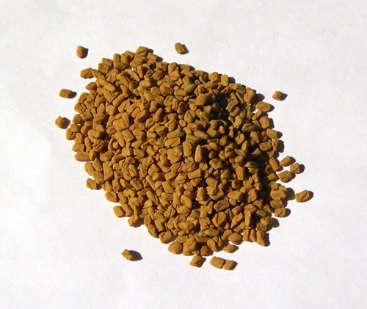Description
Botanical: Trigonella foenum-graecum
Other common names: Bird's Foot, Greek Hayseed, Trigonella
"The greatest medical discovery since the dawn of history” is how the makers of Lydia Pinkham's Vegetable Compound described their Fenugreek-rich remedy for "female complaints" in 1875. Fenugreek's value in herbal medicine is still respected today, and it continues to be a wonderful way tosoothe the stomach and gastrointestinal tract and also clear the body of accumulated mucus. Recent research indicates that Fenugreek Seed may be helpful for lowering cholesterol and blood sugar levels.
Country of Origin: India
Beneficial Uses:
Fenugreek has many beneficial effects on the respiratory system and is an effective treatment for lung disorders. It is a fine herbal expectorant that may relieve asthma and sinus problems by reducing mucus and is also good for coughs and cold. Fenugreek is said to dissolve hardened masses of accumulated mucus and is considered a treatment for tuberculosis. As a body cleanser and expectorant, Fenugreek is said to expel toxic waste and mucus through the elimination system. Used externally, Fenugreek's mucus-dissolving properties help to ease sore throat when used as a gargle.
Fenugreek is believed to be an anti-inflammatory agent that alleviates gastrointestinal disorders and digestive problems. Moreover, increased bile acid secretion also helps the digestive process, and the high mucilage content in the herb soothes mucous membranes and lubricates the intestines. Fenugreek is also thought to relieve intestinal gas and act as a mild laxative.
Used as a topical anti-inflammatory, Fenugreek helps to relieve external inflammations of all kinds. When made into a poultice, it is effective in relieving ulcers, swollen glands, gout, sciatica, neuralgic pains, skin irritations, wounds and bruises. When applied to the skin, Fenugreek is thought to decrease skin pain and reduce swelling.
Some reports by non-nursing women indicate that Fenugreek may enlarge the breasts. The effect was not due to any estrogen supplied by the herb, but to the changes in liver enzymes that slow the rate in which a woman's body breaks down estrogen. Fenugreek has been used for centuries to promote lactation in nursing mothers and may ease the symptoms of mastitis.
The diosgenin content in Fenugreek is said to be important in the synthesis of oral contraceptives and sex hormone treatments.
Fenugreek's properties as an aphrodisiac were considered valuable in ancient times, and some believe that use is still valid today.
Pursuant to the previous information, another, later study (2015) from three Australian universities found that a standardized Fenugreek extract was able to enhance healthy sexual desire in women with self-reported low sex drive. The results were associated with significant increases in measures of sexual cognition, arousal, sexual behavior, drive and orgasm - and in particular, desire and arousal.
Fenugreek is said to also lower high cholesterol. In further studies, the herb decreased the levels of low-density lipoprotein (LDL or bad cholesterol) in the blood without affecting the good cholesterol. The seeds contain natural saponins (or "soaps") that cleanse the bulkier forms of cholesterol from the bile, and the high fiber content in the seeds may be another reason for its cholesterol lowering qualities, because fiber frequently inhibits the absorption of cholesterol and facilitates its movement through the system.
Fenugreek is considered a restorative tonic that is often given to people recovering from a variety of illnesses.
Contraindications:
Because Fenugreek Seed may interfere with the absorption of iron, people with anemia should avoid its use. Pregnant women should not use this herb, as it may stimulate uterine contractions, and it is advisable for nursing mothers to consult their physicians before use. There may be a maple syrup smell in your sweat or urine, and in infants exposed to Fenugreek through breast milk, you may notice a maple syrup odor in their urine. Fenugreek may also alter the balance of various forms of thyroid hormones and should not be used by those taking thyroid hormone medication.
Large doses (many times the recommended amounts) are not recommended, as it may cause nausea, diarrhea and gas. Diabetics should always consult a physician before using Fenugreek. Do not take Fenugreek without talking to your doctor first if you are taking blood thinning medicine (examples: warfarin, aspirin, enoxaparin, etc.) or medicine for diabetes (examples: metformin, glyburide, insulin, etc.). Do not take Fenugreek at the same time as other medications; separate administration by an hour or two. The FDA lists Fenugreek as "generally regarded as safe."


